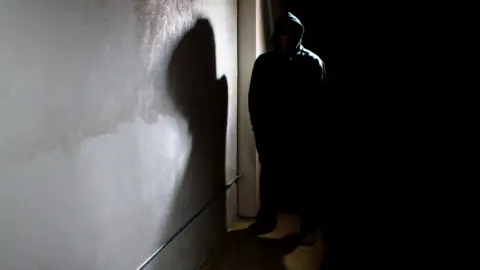Coronavirus: Public urged to watch out for fake products after 'surge' in reports
 Getty Images
Getty ImagesThe public have been warned to stay vigilant to criminals selling fake coronavirus-related products.
The Local Government Association said some councils have seen a "significant surge" in reports of scams by those seeking to exploit virus fears.
More than 500,000 sub-standard masks were seized by a London council, while other criminals have attempted to trick people into giving personal details.
The LGA is calling on the public to report scams to their local council.
Fraudsters are seeking to take advantage of public fears by selling bogus medical products and other counterfeit items.
The LGA - which represents councils in England and Wales - said criminals have been preying on vulnerable and older people who are self-isolating.
In one case, a woman in her 80s answered the door to a man who demanded £220 to complete a health and safety check.
Meanwhile, a telephone conman is being investigated after posing as a Swindon Council worker sorting lockdown food parcels, in a bid to obtain a pensioner's personal details.
A car repair garage was reported after allegedly trying to sell coronavirus testing kits to customers.
In Ealing, 2,600 illegal bottles of hand sanitiser as well as 500,000 substandard face masks were taken off the market by the local council, according to the LGA.

- A SIMPLE GUIDE: How do I protect myself?
- AVOIDING CONTACT: The rules on self-isolation and exercise
- HOPE AND LOSS: Your coronavirus stories
- LOOK-UP TOOL: Check cases in your area
- FACE MASKS: Should I be wearing one?

Residents are being tricked into buying goods online, door-to-door, by phone, text and email, the LGA said, with councils advising people not to accept services from strangers or cold callers.
Simon Blackburn, chairman of the LGA's Safer and Stronger Communities Board, warned the public to be "cautious", adding: "If something doesn't seem right or sounds too good to be true, don't hesitate to end a phone call, bin a letter, delete an email or shut the door."
He advised people to report scams to avoid others becoming victims of these "despicable crimes" and so fraudsters could be brought to justice, with councils seeking "the toughest penalties".
It comes after the National Crime Agency (NCA) warned the virus was increasingly being used as a "hook to commit fraud" and that such scams were "likely to increase" during the pandemic.
And it's not just bogus health products being sold by fraudsters.
Some people hoping to buy kittens and puppies during the lockdown are being conned with fake online advertisements, according to Action Fraud, with victims losing more than £280,000 in two months.
